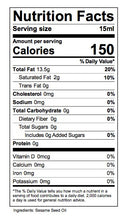Good Eats: Chicken, pork and vegetable stir fries. Sear and roast salmon. Grilled shrimp and scallops. Use as a salad dressing for citrus salads.
Perfect Pairs: Pineapple, Honey-Ginger or Blackberry-Ginger Balsamic
Ingredients: Sesame Oil
Sesame seeds are flat, tiny seeds with a rich, nutty, sweet flavor, which come from a flowering plant of the same name. Sesame oil is derived from these seeds and is used widely in Chinese, Japanese, and Korean cooking, and to a lesser extent in South Asian and Southeast Asian cuisines
It is thought that sesame originated in sub-Saharan Africa, but according to Assyrian legend, when the gods met to create the world, they drank wine made from sesame seeds. Sesame seeds figure prominently in Hindu legends and beliefs, where they are a symbol of immortality. "Open sesame", the phrase from Arabian Nights, reflects the distinguishing feature of the sesame seed pod, which bursts open when it reaches maturity.
In ancient times, sesame oil was put to use as a food, a salve for burns and cuts, and as a lamp oil. Sesame seeds were one of the first crops to be processed for oil, and sesame oil was one of the first recorded condiments.
Roasted Sesame Oil is [duh] made from toasted sesame seeds, and is darker than cold-pressed sesame oil. Roasted sesame oil has a lower smoke point, and is recommended for use at lower [not deep-frying] temperatures. Roasted sesame oil is well suited to stir-frying meats and vegetables, and for sautes and omelets. East Asian cuisines often call for sesame oil for seasonings, dips and dressings.
Use Roasted Sesame Oil in Asian recipes or as a marinade for meats and fish. Roasted Sesame Oil adds a deep, rich flavor drizzled over rice recipes, grilled vegetables, and dishes like hummus, which are made from tahini [sesame butter].
Roasted Sesame Oil + Honey Ginger Balsamic = delicious vinaigrette for Asian-themed salads and slaws!




